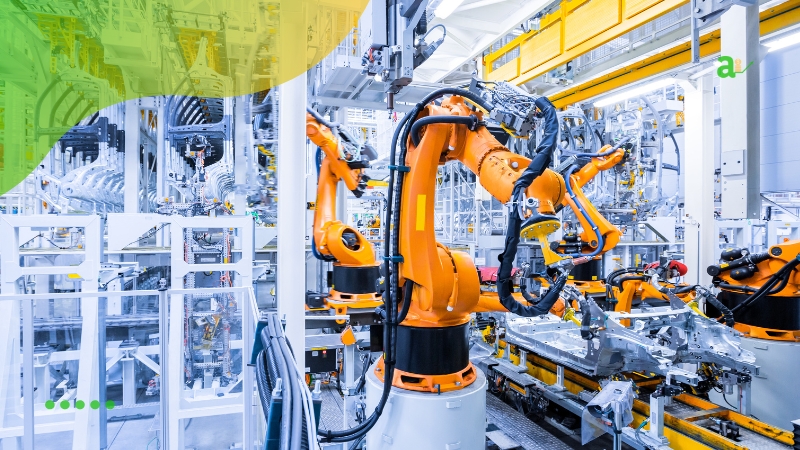Technology is transforming the way we live, work, and relate to the professional world. And the impact of technology on the job market has never been as evident as it is now.
In this scenario, it is essential to understand how these innovations are reshaping functions, redefining priorities, and requiring new skills.
Professionals from all areas need to keep up with this evolution, whether to stay competitive or to explore new opportunities. The impact of technology on the job market is no longer a future trend, it is happening now.
In this article, you’ll find out how technology is affecting the job market, which professions are at risk, what changes with artificial intelligence, and what you can do today to adapt and get ahead. Let’s go!
Automation is changing everything

Technology is transforming the world of work quickly and inevitably. One of the most striking changes is automation. The use of systems and machines to perform tasks that previously relied solely on people.
Today, activities such as customer service, data entry, and even creative tasks, such as writing and design, can already be done by software and artificial intelligence.
This increases efficiency and agility for companies, but also has direct impacts on those who work in these areas.
With automation gaining ground, some jobs are losing value in the market and even becoming obsolete.
Therefore, keeping up with these changes is no longer an option, it is a necessity. Those who want to remain competitive need to develop new skills, focus on tasks that require critical thinking, creativity, empathy, and constant adaptation.
Is a diploma still important? (Impact of technology on the job market)
For a long time, having a degree was synonymous with open doors in the job market. Today, this logic is changing. The focus is increasingly on real skills, and less on formal credentials.
The reason for this is that companies have already realized that there is no relationship between employee performance and the university where they studied.
Therefore, talent does not come with the seal of an institution. This change in mentality makes room for professionals without training, but who know what matters, the skills required by the position.
In short: the diploma still has value. Especially for technical positions and regulated areas.
However, he is no longer the only passport to success. Practical skills, continuous learning, and a proactive attitude are gaining more and more weight in hiring decisions. Therefore, the opportunity belongs to those who are willing to truly learn.
The use of AI is increasing
After surprising the world in 2023, generative artificial intelligence has entered companies for good.
According to McKinsey’s global survey, 65% of organizations already use AI, almost double the number recorded just ten months earlier.
The impact is clear: more productivity, efficiency, and agility in processes. Even so, only 3% of companies are at a truly mature stage of AI adoption. In other words, most are still in their infancy and this makes room for a large division in the market.
Those who have already started to apply AI strategically come out ahead. Those who have not yet moved run the risk of falling behind quickly.
If you want to be prepared for the future, the time to act is now. AI is no longer a trend, it is a fast-growing reality.
Will AI kill jobs?
The idea that artificial intelligence will replace all jobs is scary — and rightly so. But the truth is that we will not be replaced by AI, but by whoever knows how to use it best.
Mastering AI goes beyond knowing how to push buttons: it’s about developing a real intuition about how to use it strategically.
It is important to emphasize that AI can accentuate social inequalities if access to technology is restricted to an elite. Instead of leveling the playing field, it can create an even wider chasm between those who have and those who don’t have learning opportunities.
In this way, it is clear that the future will not be dominated by robots, but by people who learn quickly, adapt and know how to use technology as an ally. The risk is not in the AI itself, but in ignoring it.
Therefore, we recommend that you explore online course platforms, where you can study about artificial intelligence. Some well-known platforms are: Coursera, Harvard University, Udemy, among others.
The way people work is changing (Impact of technology on the job market)
The way people work is undergoing a transformation and this change goes beyond the adoption of new technologies.
We are facing a new logic of organization, where work is no longer centered only on human capabilities and starts to be shared with artificial intelligence systems and automation tools.
This change requires a new way of thinking about work.
Functions are redistributed, operational flows are redesigned, and productivity metrics need to be reviewed.
It no longer makes sense to measure performance only based on hours worked or number of tasks performed. The focus shifts to impact, efficiency, and the ability to generate real value.
This movement is not just about technological innovation, but about cultural transformation.
Leaders must embrace change with an open mindset above all. Professionals must actively learn, master new tools, and find meaning in what they produce.
Gen Z is changing everything

Today, the most valuable content on companies’ social networks does not come from celebrities or millionaire campaigns, it comes from the employees themselves.
Employees are leading a new trend called EGC (Employee Generated Content), sharing their daily routines, behind-the-scenes moments, and even their ‘look of the da
This type of content brings together, humanizes, and generates trust in the audience, creating real connection.
In fact, EGC has already left LinkedIn and is now a bomb on Instagram, TikTok, and YouTube, turning employees into brand influencers — in an authentic and spontaneous way.
This movement is in line with the arrival of Generation Z in the job market. After all, this generation will represent 25% of the global workforce in 2025. In the U.S., 1 in 10 managers will be Gen Z next year, according to Glassdoor.
And there’s more: Generation Z is also the one that takes the most leaves for mental health, which raises an alert. Therefore, well-being should be the focus of companies in the long term.
Basically, this means that:
- Companies need to review their communication and HR strategies;
- Real people build the brand’s digital presence from the inside out;
- Creating a healthy environment and giving employees a voice is essential to attract and retain talent.
In short: marketing is collective, authentic and purposeful. And whoever understands this first, comes out ahead.
Conclusion (Impact of technology on the job market)
Now you know the main impact of technology on the job market. It is clear that we are experiencing a transformation never seen before. Automation, artificial intelligence, and the change in the profile of new generations are redesigning what it means to work, produce, and generate value.
Some professions are being replaced, others are emerging. However, technology is not a threat, but a powerful ally for those who know how to use it intelligently.
Therefore, we recommend that you invest in continuous learning, develop digital skills and be open to the cultural changes that shape the new world of work. After all, the future belongs not to those who resist technology, but to those who understand, adapt and evolve with it.
Do you need to make money? We recommend that you know the profitable ways to earn from home that will help you make money. In fact, some options use technology as their ally.





